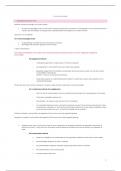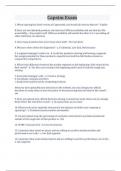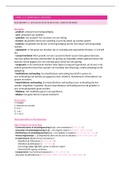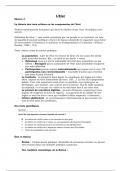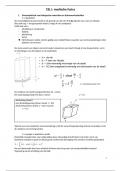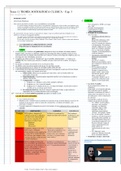what disciplines does pharmacology include? -
anatomy, physiology, psychology, chemistry, and biology
drug -
any chemical that can affect living processes
pharmacology -
study of drugs and their interactions with living systems
clinical pharmacology -
study of drugs in humans
therapeutics -
use of drugs to diagnose, prevent, or treat disease or to prevent pregnancy
the three most important properties of an ideal drug -
effectiveness, safety, selectivity
effectiveness -
most important property a drug can have
safety -
drug cannot produce harmful effects
selectivity -
drug elicits on the response for which it is given
adverse effect of anticancer drugs -
increase risk of infection
adverse effect of opioid analgesics -
at high doses cause respiratory depression
adverse effect of aspirin and other related drugs -
severe gastric ulceration, perforation, and bleeding when taken for prolonged period
of time
additional properties of an ideal drug -
reversible action, predictability, ease of administration, freedom from drug
interactions, low cost, chemical stability, simple generic name
the therapeutic objective of drug therapy -
to provide maximum benefit with minimum harm
important determinants of drug responses -
dosage size, route of administration, dose timing
1|Page
, pharmacokinetics -
impact of the body on drugs (how body interacts with drugs)
4 major pharmacokinetic processes -
absorption, distribution, metabolism, excretion
pharmacodynamics -
impact of drugs on the body
drug-receptor interaction -
binding of the drug to its receptor
patient's functional state -
influences pharmacodynamic processes
placebo effect -
also help to determine the responses a drug elicits
sources of individual variation -
physiologic variables , pathologic variables, genetic variables, drug interactions
physiologic variables -
age, gender, weight
pathologic variables -
diminished function of kidneys and liver
genetic variables -
can alter the metabolism of drugs and predispose the patient to unique interactions
nursing responsibilities regarding drugs -
right drug, patient, dose, route, time, assessment, documentation, evaluation, patient
to education, and patient to refuse care
application of pharmacology in patient care -
1. preadministration assessment 2. dosage and administration 3. evaluating and
promoting therapeutic effects 4. minimizing adverse effects 5. minimizing adverse
interactions 6. making PRN decisions 7. managing toxicity
Give the patient the following information -
name of drug, dosage and schedule of administration, technique of administration,
duration of drug use, and storage of drug
nursing process in drug therapy -
preadministration assessment, analysis and nursing diagnosis, planning,
implementation, and evaluation
1st law to require proof of drug effectiveness and established procedures for testing -
Harris-Kefauver Amendments, 1962
2|Page

